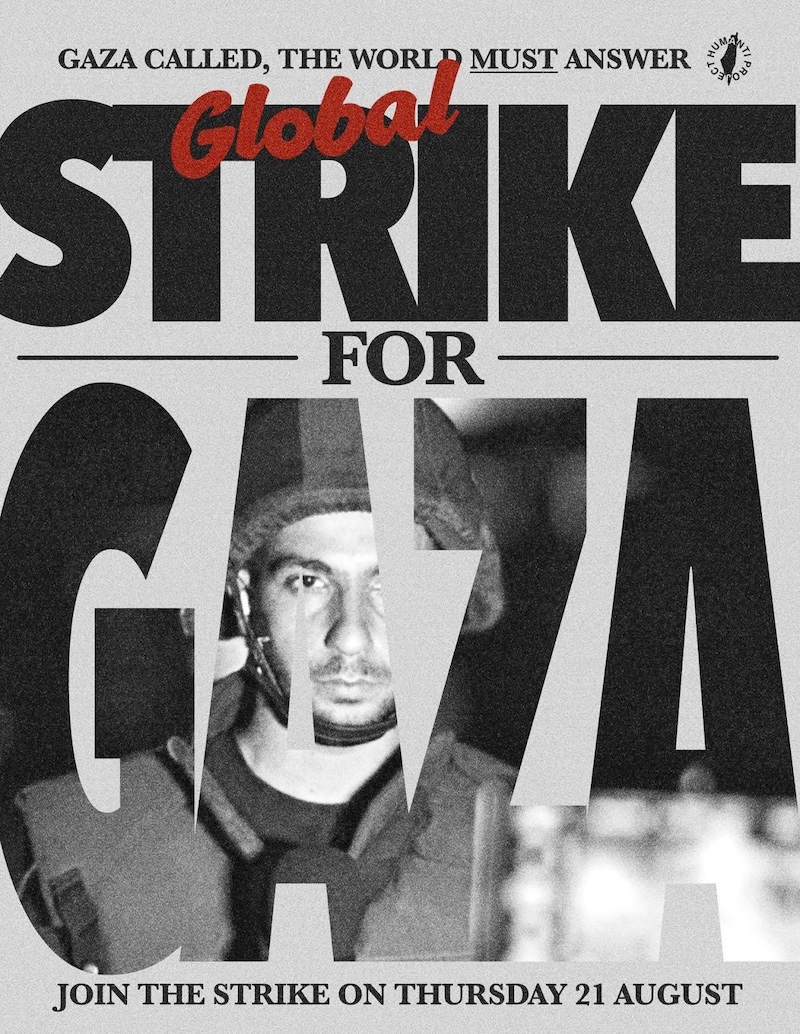How do you stop a genocide? Stop spending. Stop traveling. Stop everything, that's how! And we just might end up saving our country and ourselves in the process. Targeted strikes have a very successful track record. The following Substack from Aalia Mauro gives a few notable examples from right here in the good ol' USA! When our leaders fail it's our responsibility to stand up for what's right. History will judge us on what we do in this moment. How do you want to be remembered?

Global Strike for Gaza: Why This Moment Calls for Economic Disruption
AUG 19, 2025
Israel is pushing to permanently erase Palestinians from Gaza. Two million people are being driven toward death. This week alone, 266 have starved, 112 of them children.
Our Global Duty
Bisan Owda sounded the alarm: When governments refuse to listen, it’s on us, the global collective, to act. That’s why this is not another statement in the feed. This is a Global Economic Strike for Gaza, starting Thursday, August 21, 2025, and every Thursday after. Every swipe not made, every tap not executed, every commute avoided, matters.
What to Do (Step-by-Step)
- No purchases on Thursdays — groceries, coffee, online orders, nothing. Also cancel or pause subscriptions auto-deducted on that day.
- Avoid public transit — walk, bike, carpool instead. If you must ride, buy tickets in advance so no transaction is registered on Thursday.
- No fuel. No charging. Let every penny you don’t spend be part of the collective impact.
-
Work-safe advice: This isn’t about risking your job. If possible, use a day off. But if you can’t—every act of non-spending still builds power.
The Power of Withholding Spending
In many Western economies, household consumption makes up 60–70% of GDP. That’s not some abstract statistic, it’s the lifeblood of the system. When we stop spending for a day, it shows up in retail data, energy reports, and financial flows. Analysts notice. Politicians pay attention.
In the U.S., consumer spending averages $45–50 billion per day. A 5% participation rate in the strike could deliver a $2–2.5 billion dent in a single day. Sustained weekly, that becomes an undeniable pattern of disruption.
History Shows It Works
- Montgomery Bus Boycott (1955–56): What began as a one-day protest after Rosa Parks' arrest became a 13-month mass action. The city’s bus company collapsed under lost revenue, and the boycott ended segregation via a Supreme Court ruling.
- Delano Grape Strike (1965–70): Farmworkers, Filipino and Mexican, used consumer boycotts against non-union grapes alongside community organizing. It forced major grape growers to negotiate, resulting in the formation of the United Farm Workers union.
- Cottage Cheese Boycott in Israel (2011): Social media sparked a public refusal to buy cottage cheese. Sales dropped by 30%, and prices fell noticeably, proof that even basic staples, when withheld, can shift markets.
- Longstanding Boycotts Against South Africa’s Apartheid: International consumer boycotts—targeting South African goods, helped delegitimize apartheid globally and fed sustained pressure that contributed to its end.
- Coors Beer Boycott (1970s–80s): A boycott against Coors for discriminatory practices sliced state-level market share from over 40% to under 20%, forcing concessions, even though the union effort ironically dissolved.
In every case, when people collectively hit systems where it counts, at the ledger, the consequences are real.
Why It Matters Now
- Consumer spending shapes economies — in the U.S., it once averaged over 66% of GDP—and remains the central driver today Federal Reserve Bank of St. LouisBureau of Labor Statistics.
- Boycotts send signals beyond short-term data — brands suffer reputational damage, market perceptions shift, and political space opens ReutersNew York Post.
- Recent economic blackouts show the need for scale and consistency. A 24-hour February 2025 protest called an “economic blackout” didn’t make headlines because participation was patchy AP NewsBusiness Insider. Weeklong or repeated actions are significantly more disruptive Modern Retail.
A Global, Measured, Moral Response
This isn’t symbolic. It's not performative. It’s strategic, measurable, and moral. It says, “We cannot, and will not, be complicit.”
This strike directly confronts the systems upholding genocide, systems of money, weapons, silence, and complicity. One day of non-spending per week may feel small, unless millions join, and it becomes an undeniable economic pattern.
Let the World See Us Act
On August 21, 2025:
- Stop working if you can.
- Stop buying.
- Stop fueling the machine.
- Record your reason. Share your face, your voice, your truth.
- Use #StrikeForGaza.
If history asks what you did when Gaza was starved, burned, betrayed, let your answer be clear: “I struck. I did not sit silently. I withheld my labor, my spending. I helped stop the machine.”
Together, we are stronger. Together, we can make the world stop, so Palestine can breathe.
Want to do even more? Join us and let's get to work!
About the author:
I’m Aalia Mauro, a climate educator, storyteller, and tech founder. I write about the climate crisis, capitalism, collective liberation, and the fight to build a future we can actually live in.
I got into environmental activism in university and never looked back. My work focuses on breaking down climate science so everyone can understand what’s at risk, and how we fight back. I believe in degrowth, and in action, not just awareness.
I’ve always spoken out against war, ICE, and police violence. After years of watching the Genocide unfold, I joined the Global March to Gaza through Cairo as part of my direct action for Gaza, and I’m heading to the internment camp in the Florida Everglades next. I’m also organizing to join the flotilla to Gaza, because solidarity means showing up.
This work is 100% reader-supported. If it moves you, subscribe. Help me keep building.
PS: If you are not following me on the following platforms, I am about to seriously ramp up activity on all of them. I’d love to have you there.